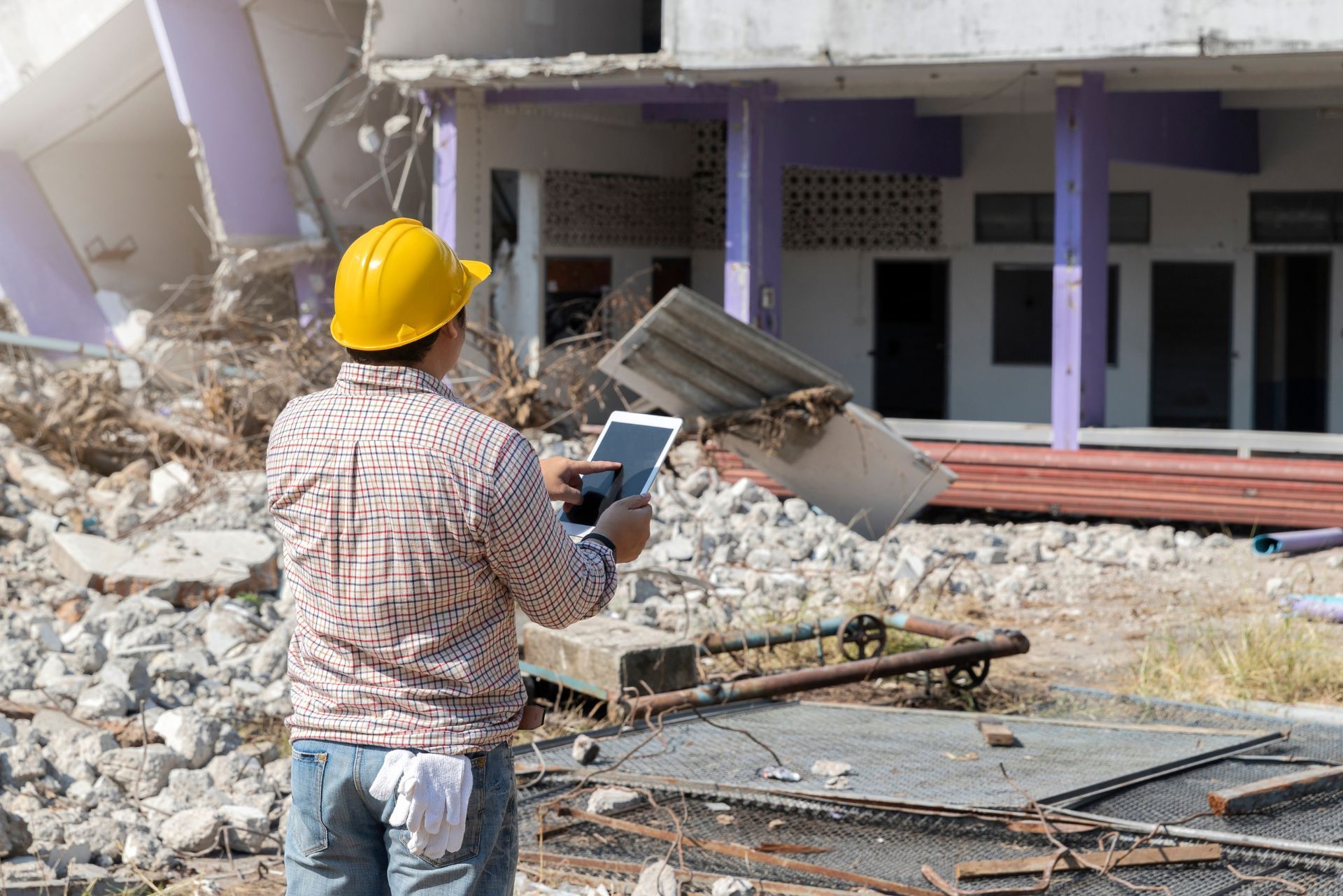Arizona Demolition Contractor Insurance
See How We're Different:
or Call Us:(480) 526-3222

Most Common Business Policies
Index
Understanding Demolition Contractor Insurance
Types of Insurance Coverage for Demolition Contractors
Legal Requirements for Demolition Contractors in Arizona
Choosing the Right Insurance Policy
Cost of Demolition Contractor Insurance
Common Misconceptions About Demolition Contractor Insurance
Contact Us
When it comes to demolition work, safety and compliance are paramount. For contractors operating in Arizona, understanding the nuances of demolition contractor insurance is essential not only for legal compliance but also for protecting your business from potential risks. This article delves into the various aspects of demolition contractor insurance, including types of coverage, legal requirements, and tips for choosing the right policy.
Understanding Demolition Contractor Insurance
Demolition contractor insurance is specifically designed to protect businesses engaged in demolition activities. This type of insurance covers a range of risks associated with the demolition process, from property damage to bodily injury. Given the inherently hazardous nature of demolition work, having the right insurance is not just advisable; it is often a legal requirement.
Why Insurance is Crucial for Demolition Contractors
The demolition industry faces unique challenges, including the potential for accidents that can lead to significant financial losses. Without proper insurance, a single incident could jeopardize the entire operation. Insurance not only safeguards the contractor but also provides peace of mind to clients, ensuring that they are protected from any liabilities that may arise during the project. Furthermore, many clients require proof of insurance before awarding contracts, making it essential for contractors to maintain adequate coverage to remain competitive in the industry.
Common Risks in Demolition Work
Demolition contractors face various risks, including:
- Property Damage: Accidental damage to surrounding properties can lead to costly claims.
- Bodily Injury: Workers are at risk of injuries from heavy machinery and falling debris.
- Environmental Hazards: Exposure to hazardous materials, such as asbestos, can pose serious health risks.
These risks underscore the importance of having comprehensive insurance coverage tailored to the specific needs of demolition work. In addition to the aforementioned risks, contractors must also be vigilant about the potential for equipment failure, which can result in delays and additional costs. Moreover, the presence of underground utilities can complicate demolition projects, leading to unexpected liabilities if not properly managed. As such, contractors should consider specialized policies that address these unique challenges, ensuring that they are prepared for any scenario that may arise during a project.
Moreover, understanding the nuances of different insurance policies is critical. For instance, general liability insurance may cover basic risks, but additional coverage options such as workers' compensation, pollution liability, and equipment insurance can provide a more robust safety net. Each of these policies serves a specific purpose, and together they create a comprehensive risk management strategy that can protect both the contractor and their clients throughout the demolition process. As the industry evolves, staying informed about insurance options and regulatory requirements is essential for maintaining compliance and ensuring the longevity of the business.

Types of Insurance Coverage for Demolition Contractors
Demolition contractors typically require several types of insurance coverage to protect their business adequately. Understanding these different types can help contractors choose the right policies for their needs.
General Liability Insurance
General liability insurance is a fundamental coverage for any contractor. It protects against claims of bodily injury or property damage that may occur during the demolition process. For example, if a passerby is injured on the job site, this insurance can cover medical expenses and legal fees. Additionally, it can safeguard against claims arising from damage to neighboring properties, which can be particularly pertinent in urban areas where structures are closely situated. Having this insurance not only provides financial protection but also enhances the contractor's credibility when bidding for projects, as clients often look for contractors who are adequately insured.
Workers' Compensation Insurance
workers' compensation insurance is mandatory in Arizona for businesses with employees. This coverage provides financial support to workers who are injured on the job, covering medical expenses and lost wages. It also protects the employer from lawsuits related to workplace injuries. Beyond the basic coverage, many contractors opt for additional riders that can include rehabilitation services for injured workers, ensuring they receive the necessary support to return to work safely. This not only fosters a safer work environment but also boosts employee morale, as workers feel valued and protected by their employer.
Commercial Auto Insurance
For demolition contractors who use vehicles for transporting equipment or personnel, commercial auto insurance is essential. This policy covers vehicles used for business purposes, protecting against accidents and damages that may occur while on the road. Furthermore, it can include coverage for specialized vehicles, such as dump trucks or excavators, which are often integral to demolition projects. In addition to protecting against physical damage, commercial auto insurance can also cover liability for injuries or damages caused by employees driving company vehicles, ensuring comprehensive protection for the contractor's operations.
Pollution Liability Insurance
Pollution liability insurance is increasingly important for demolition contractors, especially when dealing with older structures that may contain hazardous materials like asbestos or lead. This coverage protects against claims related to the release of pollutants during demolition activities, which can lead to significant environmental damage and costly cleanup efforts. Given the stringent regulations surrounding hazardous waste disposal, having this insurance can prevent financial ruin from unexpected liabilities. Moreover, it demonstrates a contractor's commitment to environmental responsibility, which can be a significant selling point for clients who prioritize sustainability in their projects.
Equipment Insurance
Equipment insurance is another critical type of coverage for demolition contractors, as it protects the tools and machinery essential for their operations. This policy covers theft, damage, or loss of equipment, which can be particularly vulnerable on job sites. Given the high cost of specialized demolition tools and machinery, having this insurance can save contractors from substantial out-of-pocket expenses. Additionally, some policies offer rental reimbursement, which can help contractors continue operations without interruption while their equipment is being repaired or replaced. This coverage not only secures the contractor's investment but also ensures that projects can proceed on schedule, maintaining client satisfaction and trust.
Legal Requirements for Demolition Contractors in Arizona
In Arizona, demolition contractors must adhere to specific legal requirements regarding insurance. Understanding these regulations is crucial for compliance and avoiding potential fines or legal issues.
Licensing Requirements
Before undertaking demolition projects, contractors must obtain the appropriate licenses from the Arizona Registrar of Contractors. This process typically requires proof of insurance, ensuring that contractors are financially responsible for any damages or injuries that may occur during their work. Additionally, contractors may need to demonstrate their experience and knowledge of safety protocols, as well as pass a written examination that covers relevant laws and regulations. This thorough vetting process helps to ensure that only qualified professionals are allowed to operate in the demolition industry, ultimately protecting both workers and the public.
Minimum Insurance Coverage Limits
Arizona does not mandate specific insurance coverage limits for demolition contractors, but it is advisable to carry sufficient coverage to protect against potential claims. Many contractors opt for general liability coverage of at least $1 million, but higher limits may be necessary depending on the scale of the projects. Furthermore, contractors should consider additional coverage options, such as workers' compensation insurance, which is essential for protecting employees in the event of workplace injuries. This not only safeguards the contractor's financial interests but also fosters a safer working environment, which is paramount in an industry known for its inherent risks.
Environmental Regulations
In addition to licensing and insurance, demolition contractors in Arizona must also comply with environmental regulations that govern the disposal of hazardous materials. This includes the proper handling and disposal of asbestos, lead, and other toxic substances that may be present in older buildings. Contractors are required to conduct thorough inspections and, if necessary, engage certified professionals to manage the removal of these materials safely. Failure to adhere to these environmental guidelines can result in severe penalties, including fines and potential legal action, highlighting the importance of diligence in every aspect of demolition work.
Safety Standards
Safety is another critical component of the legal framework surrounding demolition contractors in Arizona. The Occupational Safety and Health Administration (OSHA) sets forth strict safety standards that contractors must follow to protect their workers. These regulations cover a wide range of practices, including the use of personal protective equipment (PPE), fall protection measures, and the safe operation of heavy machinery. Regular safety training sessions are not only a legal requirement but also a best practice that can significantly reduce the risk of accidents on the job site. By prioritizing safety, contractors can enhance their reputation and ensure the well-being of their workforce, which is essential for maintaining a successful demolition business.
Choosing the Right Insurance Policy
With numerous insurance providers and policies available, selecting the right insurance can be daunting. However, a few key considerations can simplify the process.
Assessing Your Business Needs
Every demolition contractor has unique needs based on the scale of their operations, the types of projects undertaken, and the number of employees. Conducting a thorough assessment of these factors will help in determining the necessary coverage types and limits. For instance, a contractor specializing in large-scale commercial demolitions may require more comprehensive liability coverage compared to one focused on residential projects. Additionally, understanding the specific risks associated with different types of demolition work—such as the presence of hazardous materials or the proximity to populated areas—can further refine the necessary insurance coverage.
Comparing Insurance Providers
Not all insurance providers offer the same level of service or coverage options. It is essential to compare policies from various companies, looking for those with experience in the construction and demolition sectors. Reading reviews and seeking recommendations can also provide insight into the reliability of different insurers. Moreover, it is beneficial to inquire about the claims process of each provider. A company that offers a straightforward and efficient claims process can save contractors valuable time and resources when unexpected incidents occur. Additionally, consider the financial stability of the insurer, as this can affect their ability to pay claims in the long run.
Understanding Policy Exclusions
Every insurance policy comes with exclusions that outline what is not covered. It is vital for contractors to read and understand these exclusions to avoid surprises when filing a claim. Common exclusions in demolition insurance may include damages caused by intentional acts or certain environmental hazards. Furthermore, contractors should be aware of any limitations related to subcontractor work, as many policies may not cover damages resulting from the actions of subcontracted labor. This understanding can help in making informed decisions about hiring practices and ensuring that all parties involved in a project are adequately insured.

Cost of Demolition Contractor Insurance
The cost of demolition contractor insurance can vary widely based on several factors, including the size of the business, the types of projects undertaken, and the coverage limits selected. Understanding these factors can help contractors budget effectively for their insurance needs. Additionally, it's crucial for contractors to stay informed about industry trends and changes in regulations that may impact their insurance requirements, as these can lead to fluctuations in costs over time.
Factors Influencing Insurance Premiums
Several elements can affect the premiums for demolition contractor insurance:
- Business Size: Larger businesses with more employees typically face higher premiums due to increased risk.
- Project Type: High-risk projects may lead to higher insurance costs. For example, demolition projects involving hazardous materials or complex structures often require additional coverage, which can drive up premiums.
- Claims History: A history of frequent claims can result in increased premiums. Insurers often assess a contractor's past performance to gauge future risk, meaning that maintaining a good safety record is essential for keeping costs manageable.
Average Costs in Arizona
While costs can vary significantly, demolition contractors in Arizona might expect to pay anywhere from $1,000 to $3,000 annually for general liability insurance. Workers' compensation insurance costs can also vary based on payroll and risk factors, often ranging from $1,000 to $5,000 annually. Furthermore, contractors should consider additional coverages such as equipment insurance or pollution liability, which can add to the overall cost but are essential in protecting against potential losses associated with specialized equipment and environmental hazards.
In Arizona, the competitive landscape of the demolition industry can also influence insurance rates. Contractors who invest in safety training and risk management practices may find themselves eligible for discounts on their premiums. Insurers often reward proactive measures that reduce the likelihood of accidents and claims, making it beneficial for contractors to prioritize safety and compliance. Additionally, networking with other contractors and industry professionals can provide valuable insights into effective insurance strategies and potential cost-saving measures.
Common Misconceptions About Demolition Contractor Insurance
Many myths and misconceptions surround demolition contractor insurance that can lead to misunderstandings. Addressing these can help contractors make informed decisions about their coverage.
“I Don’t Need Insurance if I Have a License”
While having a license is essential for legal compliance, it does not replace the need for insurance. A license ensures that the contractor meets specific standards, but insurance protects against financial losses resulting from accidents or claims.
“Insurance is Too Expensive”
While the cost of insurance can seem high, the financial impact of not having coverage can be far greater. A single claim can lead to devastating financial consequences for a business, making insurance a worthwhile investment.
“All Insurance Policies are the Same”
This misconception can lead to inadequate coverage. Policies can vary significantly in terms of coverage limits, exclusions, and premiums. It is crucial for contractors to carefully review and compare different policies to find the best fit for their needs.
Tips for Filing an Insurance Claim
In the unfortunate event of an incident requiring an insurance claim, knowing how to navigate the process can make a significant difference. Here are some tips to ensure a smooth claims process.
Document Everything
Thorough documentation is essential when filing a claim. This includes taking photographs of the incident, gathering witness statements, and keeping records of all communications with clients and insurance representatives. Comprehensive documentation can strengthen the claim and expedite the process.
Notify Your Insurer Promptly
Most insurance policies require prompt notification of any incidents that may lead to a claim. Delaying notification can result in complications or even denial of the claim. It is advisable to contact the insurance provider as soon as possible after an incident occurs.
Follow Up Regularly
After filing a claim, following up regularly with the insurance company can help ensure that the claim is being processed. Regular communication can also provide updates on any additional information that may be required to move the claim forward.
Conclusion
In the demolition industry, having the right insurance coverage is crucial for protecting both the business and its employees. By understanding the various types of insurance available, the legal requirements in Arizona, and how to choose the right policy, demolition contractors can safeguard their operations against potential risks. Investing time and resources into securing appropriate insurance can ultimately lead to a more successful and sustainable business.
Whether you are a seasoned contractor or new to the demolition industry, staying informed about insurance options and requirements will help you navigate the complexities of this essential aspect of your business. By prioritizing safety and compliance, contractors can focus on what they do best: delivering quality demolition services to their clients.
